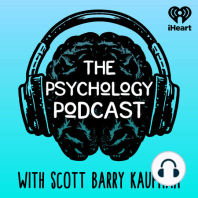46 min listen

James Flynn || Nature, Nurture, and Human Autonomy
James Flynn || Nature, Nurture, and Human Autonomy
ratings:
Length:
56 minutes
Released:
Aug 16, 2018
Format:
Podcast episode
Description
"When you turn your back on reality you lose the ability to manipulate reality. One would think that is self-evident. I didn't go into this to not try to find the truth." -- James Flynn* Today it is an honor to have Dr. James Flynn on the podcast. Dr. Flynn is Professor Emeritus at the University of Otago and recipient of the University’s Gold Medal for Distinguished Career Research. In 2007, the International Society for Intelligence Research named him its Distinguished Contributor. His TED talk on cognitive and moral progress has received over 3.5 million visits. His long list of books include Are We Getting Smarter?, What is Intelligence?, Where Have All the Liberals Gone?, Fate and Philosophy, How to Improve Your Mind, and most recently, Does Your Family Make You Smarter?: Nature, Nurture, and Human Autonomy. In this episode we cover a wide range of topics relating to intelligence and its determinants, including: Flynn’s attempts to clarify intelligence and its causes The g factor, and what gives rise to it The validity of multiple intelligences theory Intergenerational trends (the “Flynn effect”) vs. Within-generation trends The “social multiplier” model of intergenerational trends in intelligence Individual multipliers vs. social multipliers The multiple causes of black-white differences in IQ Charley Murray and the meritocracy thesis Transcending the politics of intelligence research The dangers of suppressing ideas and research The 20% wiggle room of autonomy on IQ tests The difference between internal and external environment The impact of having a “family handicap” on SAT scores What we can learn from astronomy about human intelligence Toward a meta-theory of intelligence Toward a more humane society Links Why our IQ levels are higher than our grandparents [TED Talk] Reflection about intelligence over 40 years Heritability Estimates Versus Large Environmental Effects”: The IQ Paradox Resolved The g beyond Spearman’s g: Flynn’s paradoxes resolved using four exploratory meta-analyses IQ Bashing, Breadkdancing, the Flynn Effect, and Genes Men, Women, and IQ: Setting the Record Straight The Flynn Effect and IQ Disparities Among Races, Ethnicities, and Nations: Are There Common Links? The Role of Luck in Life Success Is Far Greater Than We Realized Twitter Q & A with James Flynn 1. “Would a 100 IQ person today be a genius if transported to the year 1918? If not, why not.” https://twitter.com/robkhenderson/status/1027707019317403650 Flynn: No, they would just be better adapted in their ability to meet educational demands. 2. “Are you concerned with the growing misuse of genetic causal fallacies in heritability research, and what can be done to make sure that researchers do not assert implications that are not supported by the data? Is this a question of education?” https://twitter.com/NathanH90714587/status/1027690457504002048 Flynn: Whenever I catch them I am disturbed by both bad genetic hypotheses and bad environmental ones. 3. “What has caused the Flynn reversal in Nordic and some other rich countries? Markus Jokela suggested it could be health related.” https://twitter.com/mark_ledwich/status/1027685177231695872 Flynn: See this article in Intelligence by myself and Shayer on IQ decline. 4. “Prof. Flynn has written about the increase in non-verbal reasoning on IQ tests that is attributed to the exposure to analytical/sequential/logical reasoning through technology. What should we do, then, to increase the verbal side of our reasoning, or have we reached the peak?” https://twitter.com/jakub_ferenc/status/1027682377169076224 Flynn: Read good literature and stand out against the trend to read less and less (see Flynn, The Torchlight List and The New Torchlight List. 5. “Could the Flynn effect be based at least partially on a trade off, meaning that with change in culture promoting development of skills associated with higher IQ scores, this rise is at a cost of eg working memory?” https://twitter.com/Kap
Released:
Aug 16, 2018
Format:
Podcast episode
Titles in the series (100)
3: Talking Mastery and Social Intelligence: Robert Greene by The Psychology Podcast